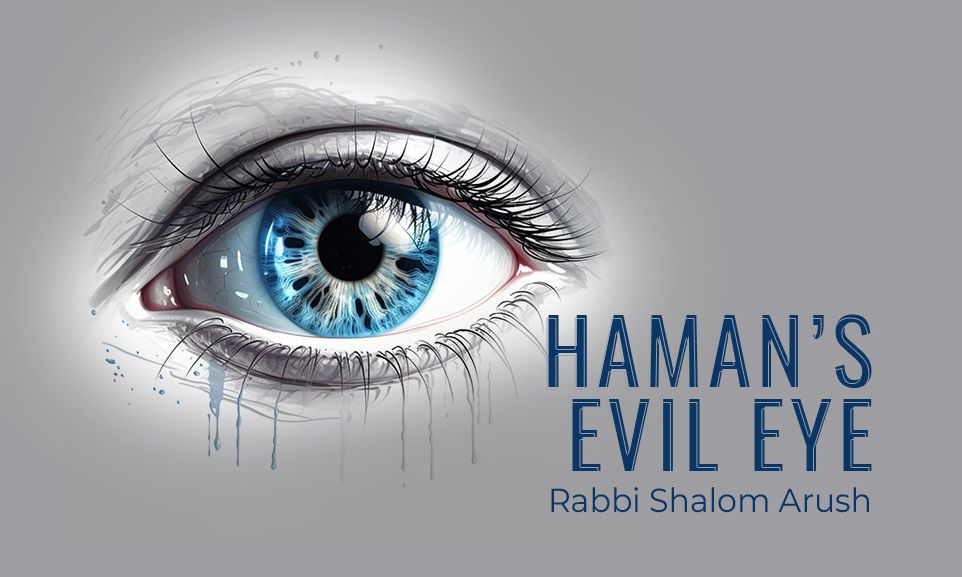
Haman’s Evil Eye
Jews who constantly praise and thank the Creator cannot be harmed by the “evil eye”. The evil eye of the ingrate Haman cannot prevail over a Jew with a "good eye".

The “good eye” is to be grateful and to thank Hashem. The “good eye” is holiness, the spiritual fiber of a Jew. The word in Hebrew for “Jew” – Yehudi – is a derivative of the word lehodot, to give thanks. A Jew is therefore one who should be grateful to Hashem and to his fellow human.
Zeresh warned Haman, her husband: “If Mordechai is from the seed of the Jews, and you have started to fall before him, you cannot prevail over him for you will surely fall before him” (Esther 6:13). What did she mean, “if”? Of course Mordechai was a Jew – they all knew that. But, there was no greater ingrate than Haman in the whole world. Hashem gave him everything – wealth, power, success. As viceroy to King Achashverosh, who was busy with his harem, Haman was the virtual ruler of 127 countries – the entire civilized world! The whole world bowed down to him. Everything was his. But he declared, “All this is worthless to me” (ibid, 5:13). Why? Because one Jew – Mordechai – wouldn’t bow down to him. This is the height of ingratitude, the “evil eye” of Haman, the spiritual impurity that is known as kelipat Haman.
Like Adam and Eve, Haman had everything. And like them, he too was dissatisfied, for he failed to look at all the abundance and good fortune that were bestowed on him and he focused on the one tiny thing that  he lacked. This is the mean spirit of stinginess, known in Hebrew as a “constricted eye”, the opposite of gratitude and magnanimity.
he lacked. This is the mean spirit of stinginess, known in Hebrew as a “constricted eye”, the opposite of gratitude and magnanimity.
As such, Zeresh is in effect telling Haman that if Mordechai has the quality of the “good eye” that is characteristic of the Jews who constantly praise and thank the Creator, then he won’t be able to overcome him, for the “good eye” is stronger than the “evil eye”. No evil eye can prevail over a person with a good eye. Mordechai surely had a good eye, for the Megilla testifies that he sought the good of everyone (ibid, 10:3).
We Jews pray every day in the Shemoneh Esrei prayer, telling Hashem, “You are holy and Your Name is holy, and the holy ones will praise You daily”. The “holy ones” are the ones that guard their eyes; these too are the ones with constant gratitude to Hashem.
Grateful people succeed. That way, they always have something to be grateful for. Their “good eye” causes a wonderful upward spiral of gratitude and success.
A grateful person excels in his fulfillment of mitzvot and in his relationships with people. He respects his parents, for he appreciates every little thing they’ve ever done for him. He appreciates his wife and looks only at her good qualities, paying attention to all the wonderful things she does for him every single day. In return, he enjoys the blessings of both his parents and his wife, and he succeeds even more. He is a walking example of gratitude for his children; they see how he thanks Mommy and how he respects his own parents. They too follow suit, so he ends up having much gratification from them as well. And more than anything, he is thanking Hashem all day long.
The Gemara teaches that it is forbidden to do a favor for an ingrate. One wonders why. Suppose a person wants to do something completely altruistic, and he knows that he’ll get no thanks for it. What could be wrong with such an action?
The Gemara answers that doing a favor for an ingrate is like committing idolatry. Idolatry? Isn’t that a harsh term? The ingrate has an inflated sense of entitlement, as if everyone owes him and he deserves everything. In that respect, he is making himself a deity, just as such arrogant ingrates as Pharaoh and Haman did. Therefore, doing any favor for such a person is like serving an idol.
Conversely, a grateful individual has no sense of entitlement. Since he doesn’t think that anyone owes him anything or that he deserves anything, he appreciates each tiny amenity in life that comes his way and expresses his gratitude both to Hashem and to his fellow man.
A person with Haman’s level of ingratitude is never satisfied and usually depressed. He is blind to the myriad of favors that Hashem does for him every moment, for nothing pleases him. But if a person follows the way of Judaism, he should be saying thank-you all day long and singing songs of praise to Hashem.
Happy Purim!











Tell us what you think!
Thank you for your comment!
It will be published after approval by the Editor.